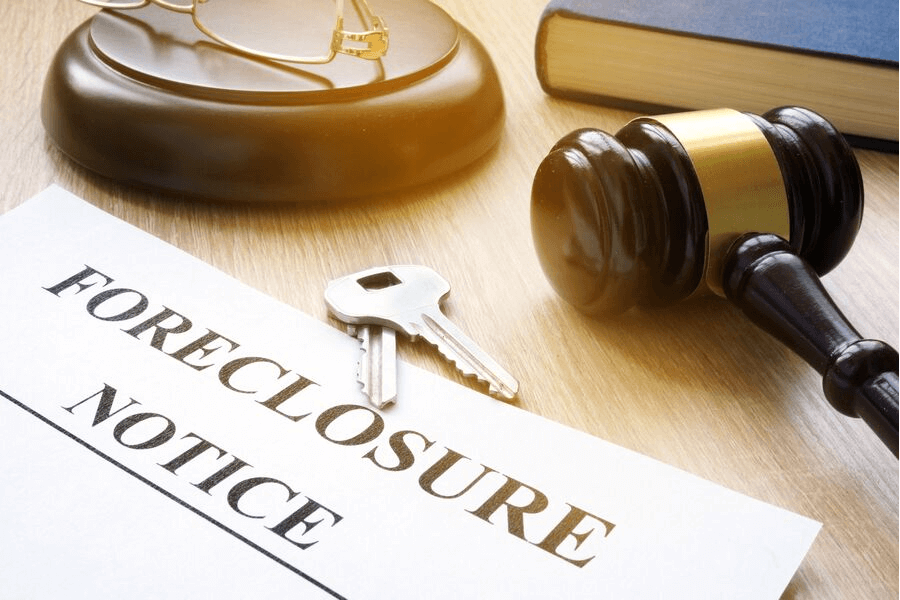Foreclosure Can Be Scary and Confusing When You
Don’t Know All of Your Options
Pick An Option Below To Let Us Help You Explore What’s Right For You
Are you currently behind on your mortgage payments and facing the stress of trying to avoid foreclosure? Are you looking for practical solutions and want to learn how to stop foreclosure as quickly as possible? At Homesmith, we understand how overwhelming this situation can be, which is why we’ve created free online guides designed to help homeowners just like you. These resources provide valuable information about the options available to you so you can make informed decisions and take steps toward resolving the challenging circumstances you’re facing right now.
You’re not alone—many people have faced foreclosure before you, and many more will face it in the future. It’s a challenging situation, but it’s nothing to feel ashamed about. Life happens, and circumstances beyond your control can lead to unexpected hardships.
The most important thing you can do right now is take a deep breath and focus on educating yourself about the options available to you. Understanding your choices will empower you to take the next steps toward resolving the situation and moving forward with confidence.
Homesmith is here to help if you’re facing the difficult prospect of foreclosure on your Ohio property and feeling uncertain about how to navigate the process. We understand how overwhelming this situation can be and are committed to providing support and guidance every step of the way. That’s why we offer a free, no-obligation consultation to help you explore your options for avoiding or stopping foreclosure whenever possible. Depending on your unique circumstances, this might involve working directly with your lender to find a resolution that allows you to keep your home or deciding that selling your house is the most practical solution for your financial well-being. Whatever path you choose, our team is here to help you make an informed decision and take control of your situation.
For some people selling their home is the preferred option (we’ll make a fair all cash offer on your house today, just let us know about your situation here <<), sometimes we’re able to help homeowners STOP FORECLOSURE completely, and sometimes there are other options.
So, select one of the buttons above or below to receive your FREE GUIDE to Stop Or Avoid Foreclosure.
“List My House For Sale”
- Have 4-6 months? Listing may put more in your pocket
- Save your credit from the wreckage of a foreclosure
- See if your situation qualifies
“Get A Fair Cash Offer Today”
- Let us know about your situation and your house
- We’ll evaluate it quickly (usually within 48 hours)
- You’ll receive a fair win-win all cash offer
5 Ways To Avoid or Stop Foreclosure In Today’s Market
DOWNLOAD YOUR FREE GUIDE HERE
Need more information on the foreclosure process and how to stop or avoid foreclosure?
FREE GUIDE: 5 Ways To STOP or Avoid Foreclosure in Today’s Market
Additionally, you can always feel free to contact us anytime if you have questions, want a no-hassle evaluation of your situation, or want to just learn more about how we can help homeowners avoid or stop foreclosure or sell unwanted properties for cash.
Just call Homesmith at (614) 401-3651 or toll free (877) HOMESMITH (466-3764)!
FAQs On Foreclosure Process In Ohio
Frequently Asked Questions
Here is a quick compilation of some of the most frequently asked questions we receive about the foreclosure process in the Buckeye State, along with our detailed answers. While we strive to provide accurate and helpful information, it’s important to note that the content on this page is intended for informational purposes only. It is NOT meant to serve as legal advice or a substitute for the personalized guidance of your own legal counsel. Every situation is unique, and having professional legal advice tailored to your specific circumstances is essential. If you have any questions or need further clarification, please don’t hesitate to reach out to us by filling out our contact form or giving us a call. We’re here to help and will be happy to provide the information you need.
What type of State is Ohio regarding to foreclosure laws?

- Foreclosures are typically judicial in the State of Ohio, meaning they go through the court system. The lender must file a foreclosure complaint and obtain a judgment from the court before proceeding with the sale of the property. Ohio also has a statutory right of redemption, which allows the homeowner to buy back the property within a certain period of time after the sale.
- State-specific laws and regulations, such as homeowner protection laws or assistance programs, can also influence foreclosure proceedings. To fully understand your rights and explore your options, it’s crucial to consult a qualified attorney or housing counselor who is well-versed in the laws and processes in your state.
What steps should a homeowner in Ohio take when notified by their lender about the risk of foreclosure?
- Contact the lender: The homeowner should reach out to their lender to discuss their situation and explore possible solutions, such as loan modification, repayment plans, or forbearance.
- Seek housing counseling: The homeowner can contact a HUD-approved housing counseling agency to get free advice and assistance in dealing with the foreclosure process.
- Review documents: The homeowner should carefully review all foreclosure notices, correspondence, and legal documents related to their mortgage and foreclosure to ensure that the lender is acting lawfully and to understand their options.
- Consider legal representation: It may be helpful for the homeowner to consult with a foreclosure defense attorney to learn about their legal rights and options for challenging the foreclosure, negotiating with the lender, or filing for bankruptcy.
- Gather financial documentation: The homeowner should gather their financial documents, such as pay stubs, tax returns, and bank statements, to demonstrate their financial situation and support any requests for loan modification or other forms of relief.
- Consider selling the property: If the homeowner is unable to keep up with their mortgage payments and cannot negotiate a viable solution with the lender, they may want to consider selling the property to avoid foreclosure and minimize their financial losses.
How can foreclosure affect the credit report of an Ohio homeowner?
- A foreclosure can have a significant negative impact on an Ohio homeowner’s credit report. It can remain on their credit report for up to seven years and can lower their credit score by 100 points or more. This can make it difficult to obtain credit in the future and may result in higher interest rates on loans and credit cards. In addition, having a foreclosure on their credit report can make it more difficult to rent an apartment or obtain insurance. It is important for Ohio homeowners to take action as soon as possible if they are facing foreclosure in order to mitigate the damage to their credit report.
What impact does foreclosure have on an Ohio homeowner’s credit report?
- Federal laws that supersede Ohio laws regarding foreclosure include the Servicemembers Civil Relief Act (SCRA), which provides certain protections to active-duty service members, and the Homeowner Protection Act (HPA), which requires lenders to provide borrowers with certain disclosures related to mortgage insurance. Additionally, federal bankruptcy laws may impact the foreclosure process by allowing borrowers to potentially delay or prevent a foreclosure through a bankruptcy filing.
What actions can you take to prevent or avoid foreclosure if you’re facing it in Ohio?
- Contact your lender: The first thing you should do is contact your lender and explain your situation. Be honest and provide any necessary documentation to support your case. You may be able to negotiate a loan modification, forbearance, or repayment plan.
- Seek assistance from HUD-approved housing counseling agencies: These agencies can provide you with free counseling and assistance with negotiating with your lender. You can find a list of approved agencies on the HUD website.
- Consider a short sale: A short sale is when you sell your home for less than what you owe on the mortgage. Your lender may be willing to accept a short sale to avoid the cost of foreclosure.
- File for bankruptcy: Filing for bankruptcy can put an immediate stop to foreclosure proceedings. However, this is a serious step that should only be taken after careful consideration and with the help of a qualified attorney.
- Sell your home: If you are unable to negotiate a loan modification or other solution with your lender, selling your home may be your best option. You can use the proceeds from the sale to pay off your mortgage and avoid foreclosure. For a free no-obigation all-cash offer, please consider contacting Homesmith at (614) 401-3651 or this link.
- Time is of the essence: Remember that time is of the essence when facing foreclosure. The sooner you take action, the more options you will have available to you.
How can filing for bankruptcy help stop or delay foreclosure when you’re facing it?
- Filing for bankruptcy can potentially stop or delay foreclosure proceedings, depending on the type of bankruptcy you file and your specific situation. Here are some ways that bankruptcy can help:
- Automatic stay: When you file for bankruptcy, an automatic stay goes into effect immediately. This means that creditors, including your mortgage lender, must stop all collection efforts, including foreclosure proceedings. The automatic stay can provide a temporary reprieve from foreclosure and give you time to catch up on missed payments or explore other options.
- Chapter 13 bankruptcy: If you file for Chapter 13 bankruptcy, you may be able to keep your home and catch up on missed mortgage payments over a three to five-year repayment plan. This can provide a more sustainable solution than trying to catch up on missed payments all at once.
- Chapter 7 bankruptcy: While Chapter 7 bankruptcy does not provide a repayment plan, it can temporarily delay foreclosure proceedings and provide you with more time to find a solution.
- Note: It’s important to note that filing for bankruptcy is not a guaranteed solution and may not be the best option for everyone facing foreclosure. It can also have long-lasting impacts on your credit and financial situation. It’s important to consult with a qualified bankruptcy attorney and explore all of your options before deciding to file for bankruptcy.
What legal expenses might an Ohio homeowner incur when contesting a foreclosure with their lender?
- The legal costs that a homeowner can expect to face when fighting a lender from foreclosure in Ohio can vary depending on the specific circumstances of the case.
- Generally, the legal costs for foreclosure defense in Ohio may include attorney fees, court filing fees, and other related expenses. The attorney fees may vary depending on the attorney’s experience, hourly rate, and the complexity of the case. Some attorneys may offer a flat fee for foreclosure defense services, while others may charge hourly.
- According to LegalMatch, the average cost of a foreclosure defense attorney in Ohio can range from $200 to $400 per hour. Additionally, homeowners may need to pay for other expenses such as court filing fees, document preparation fees, and other legal costs.
- However, homeowners may be able to obtain free or low-cost legal assistance through local legal aid organizations or pro bono programs. For example, in Ohio, the Legal Aid Society of Columbus provides free legal assistance to eligible low-income homeowners facing foreclosure.
- It’s important for homeowners facing foreclosure to consult with a qualified attorney to understand their legal options and the potential costs involved.
Homesmith Can Help You Avoid Foreclosure Or Stop It
If you’re facing foreclosure on your Ohio home and unsure of your next step, Homesmith is here to help. We provide a free consultation to explore your options for stopping or avoiding foreclosure. Our team will guide you through various solutions, such as negotiating with your lender or selling your house if that’s the best choice for you. Fill out the form below to get started today.
Ohio homeowners should act quickly when facing potential foreclosure. Taking prompt action can help prevent your property from being sold at a Sheriff’s Sale in your county’s Foreclosure Auction Location. The earlier you act, the more options you’ll have to resolve the situation.
Ohio Resources For Homeowners Facing Foreclosure
Ohio homeowners facing foreclosure have access to a variety of resources designed to help them avoid or stop the process. These resources can provide valuable assistance and guidance to navigate difficult situations. Below are some of the most helpful options available:
U.S. Department of Housing and Urban Development (HUD): Foreclosure laws vary by state. HUD provides resources and information to homeowners facing foreclosure, including counseling services and information on federal foreclosure prevention programs. The resources at the links below below can provide information on foreclosure laws in Ohio. All states have HUD-approved housing counseling agencies which can help you determine options which may meet your needs and also assist you in interacting with your lender.
https://www.hud.gov/states/ohio/homeownership/foreclosure
https://www.hud.gov/topics/avoiding_foreclosure
Ohio Attorney General – Foreclosure Frequently Asked Questions: Foreclosure is the legal process a lender uses to take back a piece of property. The following link contains answers to frequently asked questions about Foreclosure in Ohio from the office of Ohio Attorney General.
https://www.ohioattorneygeneral.gov/FAQ/Foreclosure-FAQs
Ohio Housing Finance Agency (OHFA): OHFA provides a range of resources and programs to assist homeowners who are struggling to make mortgage payments and facing foreclosure. These include foreclosure prevention counseling, loan modification assistance, and foreclosure prevention grants. Visit the OHFA website at https://myohiohome.org for more information.
Ohio Access to Justice Foundation: The Ohio Access to Justice Foundation, previously known as the Ohio Legal Assistance Foundation (OLAF), is a nonprofit organization that provides funding to legal aid organizations in Ohio. These organizations offer free legal assistance to eligible low-income homeowners facing foreclosure. The Ohio Access to Justice Foundation distributes filing fee revenue and interest earned on lawyer trust account (IOLTA) to the legal aid programs in Ohio. Through this, it is the largest funder of civil legal aid in Ohio. Visit their website at https://www.ohiojusticefoundation.org/ for more information.
The Ohio State Bar Association: The Ohio State Bar Association provides resources to homeowners who are facing foreclosure, including a list of foreclosure defense attorneys, information on foreclosure laws in Ohio, and links to other resources. Visit the OSBA website at https://www.ohiobar.org/public-resources/foreclosure-defense/ for more information.
Save the Dream Ohio Program: In April 2022, the Ohio Housing Finance Agency (OHFA) launched the Save the Dream Ohio program to help Ohio homeowners who have been financially impacted by a loss of income or increase in expenses related to the COVID-19 pandemic. OHFA encourages interested Ohio homeowners to visit savethedream.ohiohome.org or call (888) 404-4674 to learn more about the program as grant awards are subject to funding availability. The program will continue until all funding is depleted or September 30, 2025, whichever comes first.
These resources can serve as an excellent starting point for Ohio homeowners who are dealing with the threat of foreclosure and seeking ways to avoid or stop it. However, it’s crucial to consult with a qualified attorney to fully understand your legal rights, explore all available options, and assess the potential costs involved in your specific situation.


